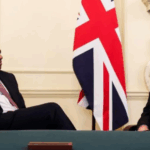The European Central Bank (ECB) has announced a quarter-point cut in interest rates, marking the third reduction this year, as it shifts its focus from combating inflation to safeguarding economic growth. The decision reflects the ECB’s recognition of improving inflation control within the eurozone, although it faces a deteriorating economic outlook.
ECB President Christine Lagarde emphasized that the “disinflationary process is well on track” and pointed to recent data that showed economic activity and sentiment surveys falling slightly below expectations. Speaking at a press conference following the announcement, she noted that the ECB is increasingly attentive to the evolving economic landscape, which has lagged behind the United States for two consecutive years.
The latest interest rate cut lowers the deposit rate that the ECB pays banks to 3.25%. With money markets anticipating three additional reductions by March 2025, the central bank has signaled a potential shift in monetary policy, responding to a combination of subdued economic growth and declining inflation rates. In September, eurozone prices grew by only 1.7%, dipping below the ECB’s 2% target for the first time in three years.
Lagarde addressed potential concerns regarding trade, particularly in light of the upcoming US presidential election, where higher tariffs on European goods could pose challenges. “Any restriction, any uncertainty, any obstacles to trade matter for an economy like the European economy, which is very open,” she stated. Additionally, she highlighted the ECB’s vigilance regarding possible oil price fluctuations tied to ongoing conflicts in the Middle East.
Despite these challenges, Lagarde reassured stakeholders that the ECB does not foresee a recession, aiming instead for a “soft landing” for the eurozone economy. She reiterated the bank’s commitment to a data-driven approach, stating that future policy decisions would be made “meeting by meeting” based on incoming economic indicators.
The interest rate reduction is seen as a response to the high costs of borrowing, which have stifled investment and economic growth in recent months. Recent data reflecting declines in industrial output and bank lending suggest continued economic weakness. Furthermore, the labour market is beginning to show signs of strain, with the vacancy rate dropping from record highs.
In light of these economic headwinds, some ECB officials have called for a more proactive approach to monetary policy. Portuguese central banker Mario Centeno warned that undershooting target inflation could hinder economic growth further, emphasizing the need for timely policy adjustments to prevent deeper economic distress.
Lagarde reiterated the importance of coordinated efforts between the ECB and European policymakers, urging them to pursue “ambitious” reforms to enhance productivity and competitiveness within the region. She underscored that tackling structural issues, such as high energy costs and Germany’s declining industrial competitiveness, is crucial for the eurozone’s long-term resilience.
For homeowners, the latest rate cut translates to monthly savings; on a €300,000 mortgage, borrowers can expect to save approximately €46. As the ECB navigates these complex economic challenges, the focus remains on fostering stability and growth in a rapidly changing global landscape.
















